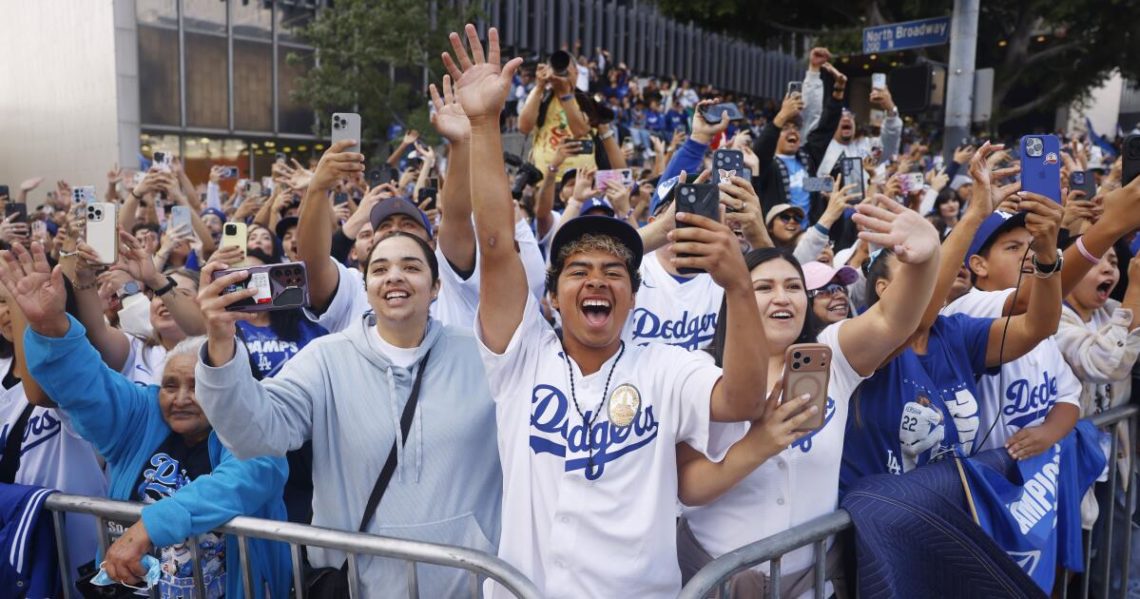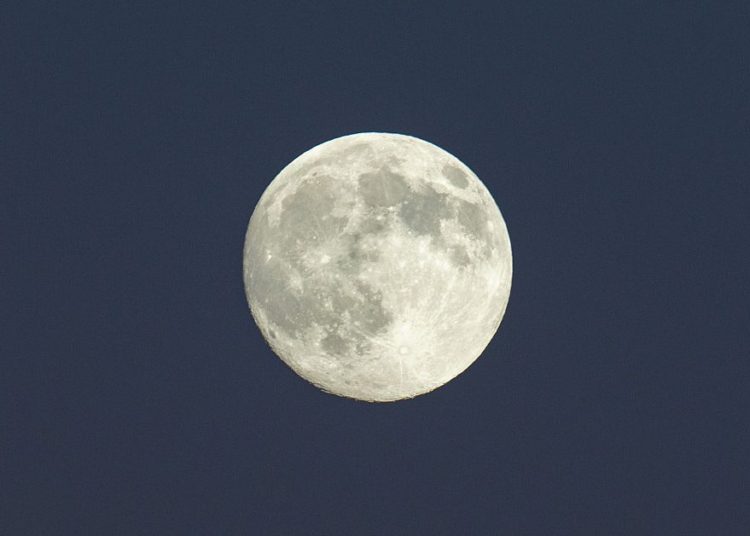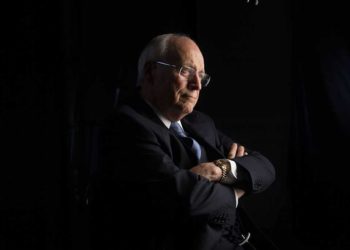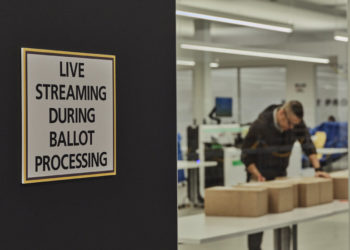MADISON, Wis. — Out in Wisconsin’s state capital, where the orange leaves are falling and every other person seems to wear the red and white of the University of Wisconsin Badgers, the pride and pain of rooting for the Dodgers in 2025 played out in the household of Carolina Sarmiento and Revel Sims.
They’re urban planning professors, Southern California natives — he’s from Eagle Rock, she’s from Santa Ana; they met at UCLA — and longtime friends of mine who have lived in Madison for a decade but are still involved in immigrant and anti-gentrification activism back home. I visited them recently as part of a speaking tour of Midwestern colleges and found myself in the middle of a debate that passed through the lives of too many people we know back home.
It’s one that’s unlikely to completely fade away no matter how many rings and parades the Boys in Blue rack up:
Is it OK to, well, revel, in this year’s World Series champs?
On one hand the Dodgers won back-to-back titles for their first time ever and became the first team to do so in a generation. The squad looked like Los Angeles at its best: people from across the world who set aside their egos to win and bring joy to millions of Angelenos in a most difficult year for the City of Angels.
L.A., a city long synonymous with winning — the weather, the teams, the people, the food — has suffered a terrible losing streak that started with the deadly and catastrophic Eaton and Palisades fires and continues with mass deportations that the Trump administration vows to escalate.
That’s where the rub came for Sarmiento and other Dodgers fans. For them, the actions and inactions of the team this year have been indefensible.
“For me, it started when the Dodgers went to the White House,” said the 45-year-old as we drove to their blue-and-white house. She especially took issue with shortstop Mookie Betts, who skipped a White House visit in 2019 when he was with the World Series-winning Boston Red Sox but shook Trump’s hand this time around, describing his previous snub as “very selfish.”
“Who got in his ear?” she exclaimed, bringing out dried mangoes for us to snack on as we waited for Sims to come home. “Since when has standing up for injustice been about you?”
Sarmiento didn’t grow up a Dodgers fan but bought into the team once she and Sims became a couple. They and their two young sons usually attended Dodgers games on trips back home and regularly caught the Dodgers in Milwaukee whenever they played the Brewers. One time, manager Dave Roberts “happily” signed a jersey for them when the family ran into him at a hotel, Sarmiento said.
In Madison, she long wore a Dodgers sweatshirt emblazoned with the Mexican flag that Sims bought for her because “it was a way to represent home. But not anymore. I tell Revel, ‘Babe, I’m not asking you to boycott the Dodgers forever, but they gotta give us something back.’”
Sure, the Dodgers blocked federal agents from entering the Dodger Stadium parking lot in June just after la migra raided a Home Depot facility. Shortly after, the team donated $1 million to the California Community Foundation to disburse to nonprofits assisting families affected by Trump’s deportation Leviathan.
But as the summer went along, Sarmiento grew frustrated that only Dodgers outfielder Kiké Hernández spoke out against immigration raids and Trump’s deployment of the Marines and National Guard. She also wondered why Dodgers chairman Mark Walter wouldn’t address charges that companies he has investments in do business with Trump’s deportation machine. One has a stake in a private prison company that contracts with the federal government to run immigrant detention centers; another has a joint venture with Palantir, which ICE has contracted to create data surveillance systems that would make the Eye of Sauron from “The Lord of the Rings” series seem as innocuous as a teddy bear.
“After a while, it’s like a woman who knows her partner is a cheater but keeps saying, ‘He’s not a cheater, he’s not a cheater’ and then gets upset when he cheats on her again. At that point, all you can say is, ‘Girl…‘”
I brought up how many Dodgers fans I know saw the team’s World Series win as a giant middle finger to Trump.
The heroes of Games 6 and 7, outfielders Kiké Hernández and second baseman Miguel Rojas, come respectively from Puerto Rico and Venezuela, a commonwealth Trump has neglected and a country he’s salivating to invade. The team’s most popular player, Shohei Ohtani, still proudly speaks in his native Japanese despite being in the U.S. for eight years and knowing some English. Tens of thousands of fans came out for the Dodgers victory parade and celebration at Dodger Stadium, many of them undoubtedly immigrants.
Isn’t it OK to let folks be happy?
“It’s like community benefit agreements,” Sarmiento responded, referring to a tactic by neighborhood groups that sees them win commitments from developers on issues like open space, union contracts and affordable housing with the threat of protests and lawsuits. “You know what’s coming, so you try to get something out of it. This year was a political moment that fans could’ve taken and they didn’t, so the Dodgers gave nothing.”
We greeted Sims as he walked in. The two of us walked down to the basement, where he watched the World Series in exile on a big-screen TV.
“It’s a little lonely being a Dodgers fan out here,” joked the 48-year-old, although he was heartened to have seen a fellow University of Wisconsin professor decked out in a Freddie Freeman jersey earlier in the day. Sims grew up going to Dodger Stadium with his father and remembered going to games on his own in the mid-2000s “when it wasn’t a pretty time.”
He brought up the Dodgers’ owner from that era: Frank McCourt, who raised ticket and concession prices seemingly every year and who still partially owns the parking lots surrounding Dodger Stadium. Fans responded to his disastrous regime by protesting before and during games. “It was disheartening to not see that in the stadium this year, when there was an even bigger problem going on.”
Sims felt “conflicted” rooting for the Dodgers this year. He watched every game he could but admitted he found the team celebrating ethnic pride nights “hollow” as raids increased across Los Angeles and the Trump administration attacked the rights of groups that the Dodgers were honoring.
“It would’ve been easy [for the Dodgers] to make a bland statement — ‘We’re a team full of immigrants in a city of immigrants and we’re proud of us all’ — and you wouldn’t have to go any further. They have a historical obligation to do that because of their history.”
But not rooting for the Dodgers was never an option.
“I want to see L.A. people happy. The parade! It’s a free holiday. People just ditch work and don’t get in trouble for it. We’re the only city — not New York, not Boston, not San Francisco — with a chant against us. We’re despised and misunderstood. So if the Dodgers win, L.A. wins.”
Sarmiento joined us. “She’s my better political half,” Sims cracked. “Caro said to pick another sport.”
“No I didn’t!” she kindly replied. “I just said to take a pause, just for now. A political pause.”
Sims admitted that that a vintage jacket that he used to bring out every October as the Dodgers made another playoff run and Wisconsin turns cold was still in the closet. “I haven’t worn any gear all year.”
“When you went to the game!” Sarmiento shot back, referring to a visit to Milwaukee earlier this year with his local softball team.
“I went with a Valenzuela jersey to represent L.A.,” Sims responded as Sarmiento shook her head.
He laughed.
“I love the team. I just don’t like this team for not saying anything. But it’s what I signed up for.”
The post Arellano: From far away, an L.A. couple grapples with all-too-familiar debate after Dodgers win appeared first on Los Angeles Times.




